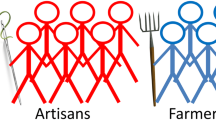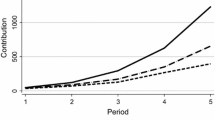Abstract
Social norms provide an important explanation for why individuals behave prosocially against their immediate material self-interest in many situations. In this study, we experimentally investigate the evolution of a fairness norm in a divide-the-dollar game. Groups distribute a fixed benefit using the decision rule voting by veto. Our experimental design varies the identifiability of group members and the stability of group composition over time. We thus manipulate in how far individuals can condition their behavior on the behavior of other subjects. Our results show that interacting in a stable group with identifiable fellow group members can activate a social norm supporting distributional fairness whereas a limited ability to observe other subjects’ actions reduces the influence of fairness. Ultimately, our findings suggest that the first two rounds of a repeated interaction play a very important role for the subsequent evolution of fairness in all treatments.
JEL Classification: C92, D02, D71, D72
Access this chapter
Tax calculation will be finalised at checkout
Purchases are for personal use only
Similar content being viewed by others
Notes
- 1.
Elster (2009) develops a similar conception of norms distinguishing moral norms, quasi-moral norms and social norms which will be discussed in greater detail below.
- 2.
Proposals with higher payoffs for the voters themselves have a lower probability of being selected as group outcomes as they rank relatively low in the other players’ preference ordering. The inverse is true, as well, as more equal proposals are relatively preferred by the other voters. See Mueller (1978) and Sauermann and Beckmann (2017) for a more detailed description of the mechanism.
- 3.
For a comparison and critical assessment of Bicchieri’s and Elster’s typologies of norms see Dubreuil und Grégoire (2013).
- 4.
More specifically, subjects with conditional preferences can only condition their behavior on the behavior of the cohort from which groups are drawn in the experiment.
- 5.
The only way to sanction other group members is to build a coalition in the following periods and exclude them from the distribution of benefits.
- 6.
English translations of the instructions can be found in the supplementary materials.
- 7.
In particular, we define proposals of 4-person coalitions as proposals where one group members is assigned less than 10 points, while all other group member receive at least 20 points in the proposal.
- 8.
Proposals for 3-person-coalitions assign at least 30 points to three group members each.
- 9.
Fair behavior is defined here as assigning oneself a fair share of the endowment in period one and two, i.e. 20 points. The patterns from figure four hold up, however, when using different operationalizations of fairness, e.g. an attitudinal measurement derived from a questionnaire that was completed by the subjects after the experiment.
References
Andreoni, James. 1988. Why Free Ride? Strategies and Learning in Public Goods Experiments. Journal of Public Economics 37 (3): 291–304.
Andreoni, James, and Rachel T. A. Croson. 2008. Partners Versus Strangers: Random Rematching in Public Goods Experiments. In Handbook of Experimental Economics Results Volume 1, edited by C. R. Plott and V. L. Smith, pp. 776–783. North Holland: Elsevier.
Baranski, Andrzey, and Rebecca B. Morton. 2020. The Determinants of Multilateral Bargaining: A Comprehensive Analysis of Baron and Ferejohn Majoritarian Bargaining Experiments. New York University Abu Dhabi, Department of Social Science Working Paper #0037.
Bicchieri, Christina. 2006. The Grammar of Society: The Nature and Dynamics of Social Norms. Cambridge: Cambridge University Press.
Bicchieri, Christina. 2008. The Fragility of Fairness: An Experimental Investigation on the Conditional Status of Pro-Social Norms. Philosophical Issues 18: 229–248.
Bicchieri, Christina, and Alex Chavez. 2010. Behaving as Expected: Public Information and Fairness Norms. Journal of Behavioral Decision Making 23 (2): 161–178.
Binmore, Ken. 2010. Social Norms or Social Preferences? Mind & Society 9: 139–157.
Bolton, Gary E., Elena Katok, and Axel Ockenfels. 2004. How Effective Are Electronic Reputation Mechanisms? An Experimental Investigation. Management Science 50 (11): 1587–1602.
Botelho, Anabela, Glenn W. Harrison, Lígia M. Costa Pinto, and Elisabet E. Rutström. 2009. Testing Static Game Theory with Dynamic Experiments: A Case Study of Public Goods. Games and Economic Behavior 67 (1): 253–265.
Cooper, David J., and John H. Kagel. 2016. Other-Regarding Preferences: A Selective Survey of Experimental Results. In The Handbook of Experimental Economics Volume 2, edited by J. H. Kagel and A. E. Roth, pp. 217–289. Princeton: Princeton University Press.
Cox, Caleb A., and Brock Stoddard. 2018. Strategic Thinking in Public Goods Games with Teams. Journal of Public Economics 161: 31–43.
Dubreuil, Benoît, and Jean-François Grégoire. 2013. Are Moral Norms Distinct from Social Norms? A Critical Assessment of Jon Elster and Cristina Bicchieri. Theory and Decision 75 (1): 137–152.
Elster, Jon. 2006. Fairness and Norms. Social Research 73 (2): 365–376.
Elster, Jon. 2007. Explaining Social Behavior. More Nuts and Bolts for the Social Sciences. Cambridge: Cambridge University Press.
Elster, Jon. 2009. Norms. In The Oxford Handbook of Analytical Sociology, edited by P. Hedström and P. Bearman. Oxford: Oxford University Press.
Fehr, Ernst, and Urs Fischbacher. 2004. Social Norms and Human Cooperation. Trends in Cognitive Sciences 8 (4): 185–190.
Fehr, Ernst, and Simon Gächter. 2000. Cooperation and Punishment in Public Goods Experiments. American Economic Review 90 (4): 980–994.
Felsenthal, Dan S., and Moshé Machover. 1992. Sequential Voting by Veto: Making the Mueller-Moulin Algorithm More Versatile. Theory and Decision 33 (3): 223–240.
Filzmoser, Michael, and Johannes R. Gettinger. 2019. Offer and Veto: An Experimental Comparison of Two Negotiation Procedures. EURO Journal of Decision Processes 7: 83–99.
Fischbacher, Urs. 2007. Z-Tree: Zurich Toolbox for Ready-Made Economic Experiments. Experimental Economics 10 (2): 171–178.
Fischbacher, Urs, and Simon Gächter. 2006. Heterogeneous Social Preferences and the Dynamics of Free Riding in Public Goods. IZA Discussion Paper No. 2011.
Fischbacher, Urs, and Simon Gächter. 2010. Social Preferences, Beliefs, and the Dynamics of Free Riding in Public Goods Experiments. American Economic Review 100 (1): 541–556.
Fischbacher, Urs, Simon Gächter, and Ernst Fehr. 2001. Are People Conditionally Cooperative? Evidence from a Public Goods Experiment. Economics Letters 71 (3): 397–404.
Gächter, Simon. 2007. Conditional Cooperation: Behavioral Regularities from the Lab and the Field and Their Policy Implications. In Economics and Psychology: A Promising New Cross-Disciplinary Field, edited by B. S. Frey and A. Stutzer. Cambridge, MA: MIT Press.
Gächter, Simon, and Christian Thöni. 2005. Social Learning and Voluntary Cooperation among Like-Minded People. Journal of the European Economic Association 3 (2-3): 303–314.
Greiner, Ben. 2015. Subject Pool Recruitment Procedures: Organizing Experiments with Orsee. Journal of the Economic Science Association 1 (1): 114–125.
Keser, Claudia, and Frans van Winden. 2000. Conditional Cooperation and Voluntary Contributions to Public Goods. Scandinavian Journal of Economics 102 (1): 23–39.
Konow, James, and Lars Schwettmann. 2016. The Economics of Justice. In Handbook of Social Justice Theory and Research, edited by C. Sabbagh and M. Schmitt, pp. 83–106. New York: Springer.
Kreps, David M., Paul Milgrom, John Roberts, and Robert Wilson. 1982. Rational Cooperation in the Finitely Repeated Prisoners’ Dilemma. Journal of Economic Theory 27 (2): 245–252.
Mueller, Dennis C. 1978. Voting by Veto. Journal of Public Economics 10 (1): 57–75.
Mueller, Dennis C. 2003. Public Choice Iii. Cambridge: Cambridge University Press.
Nicklisch, Andreas, and Fabian Paetzel. 2020. Need-Based Justice and Distribution Procedures: The Perspective of Economics. In Need-Based Distributive Justice, edited by S. Traub and B. Kittel, pp. 161–189. Berlin: Springer.
Ostrom, Elinor. 1998. A Behavioral Approach to the Rational Choice Theory of Collective Action. American Political Science Review 92 (1): 1–22.
Ostrom, Elinor. 2000. Collective Action and the Evolution of Social Norms. Journal of Economic Perspectives 14 (3): 137–158.
Pierson, Paul. 2000. Increasing Returns, Path Dependence, and the Study of Politics. American Political Science Review 94 (2): 251– 267.
Reuben, Ernesto, and Sigrid Suetens. 2012. Revisiting Strategic Versus Non-Strategic Cooperation. Experimental Economics 15 (1): 24–43.
Sauermann, Jan. 2018. Do Individuals Value Distributional Fairness? How Inequality Affects Majority Decisions. Political Behavior 40 (4): 809–829.
Sauermann, Jan. 2019. Reputation Formation in Bargaining. Partners Vs. Strangers in the Ultimatum Game. In Jahrbuch Für Handlungs- Und Entscheidungstheorie. Band 11, edited by M. Debus, M. Tepe and J. Sauermann, pp. 179–189. Wiesbaden: Springer.
Sauermann, Jan. 2021a. The Effects of Communication on the Occurrence of the Tyranny of the Majority under Voting by Veto. Social Choice and Welfare 56 (1): 1–20.
Sauermann, Jan. 2021b. Prosociality in Majority Decisions: A Laboratory Experiment on the Robustness of the Uncovered Set. Journal of Experimental Political Science doi:https://doi.org/10.1017/XPS.2020.43 (online first).
Sauermann, Jan, and Paul Beckmann. 2017. 'Divide the Dollar' Using Voting by Veto. In Jahrbuch Für Handlungs- und Entscheidungstheorie. Band 10, edited by E. Linhart, M. Debus and B. Kittel, pp. 85–109. Wiesbaden: Springer.
Sauermann, Jan, and Paul Beckmann. 2019. The Influence of Group Size on Distributional Fairness under Voting by Veto. European Journal of Political Economy 56: 90–102.
Sauermann, Jan, and André Kaiser. 2010. Taking Others into Account: Self-Interest and Fairness in Majority Decision Making. American Journal of Political Science 54 (3): 667–685.
Sauermann, Jan, Manuel Schwaninger, and Bernhard Kittel. 2021. Making and Breaking Coalitions: Strategic Sophistication and Prosociality in Majority Decisions. European Journal of Political Economy doi:https://doi.org/10.1016/j.ejpoleco.2021.102064 (online first).
Sonnemans, Joep, Arthur Schram, and Theo Offerman. 1999. Strategic Behavior in Public Good Games: When Partners Drift Apart. Economics Letters 62 (1): 35–41.
Thöni, Christian, and Stefan Volk. 2018. Conditional Cooperation: Review and Refinement. Economics Letters 171: 37–40.
Yuval, Fany. 2002. Sophisticated Voting under the Sequential Voting by Veto. Theory and Decision 53 (4): 343–369.
Yuval, Fany, and Kaisa Herne. 2005. Sophisticated Behavior under Majoritarian and Non-Majoritarian Voting Procedures. Political Behavior 27 (3): 217–237.
Acknowledgements
This project is funded by the German Research Foundation (SA 3139/1-1). Financial support from the German Research Foundation for the Cologne Laboratory for Economic Research is also gratefully acknowledged. Furthermore, we are very grateful to Anne Schümmelfeder for excellent research assistance.
Author information
Authors and Affiliations
Corresponding author
Editor information
Editors and Affiliations
Rights and permissions
Copyright information
© 2022 Springer Fachmedien Wiesbaden GmbH, ein Teil von Springer Nature
About this chapter
Cite this chapter
Beckmann, P., Sauermann, J. (2022). Social Norms and Prosociality under Voting by Veto. In: Sauermann, J., Tepe, M., Debus, M. (eds) Jahrbuch für Handlungs- und Entscheidungstheorie. Jahrbuch für Handlungs- und Entscheidungstheorie. Springer VS, Wiesbaden. https://doi.org/10.1007/978-3-658-35878-5_6
Download citation
DOI: https://doi.org/10.1007/978-3-658-35878-5_6
Published:
Publisher Name: Springer VS, Wiesbaden
Print ISBN: 978-3-658-35877-8
Online ISBN: 978-3-658-35878-5
eBook Packages: Social Science and Law (German Language)




